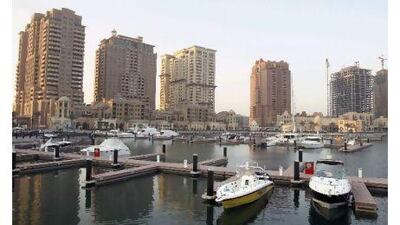The skyline is filled with construction cranes and striking architecture - towers that zigzag, glow and undulate in the night.
New man-made islands are designated for opulent luxury resorts. Business leaders talk of creating a global centre for tourism and business. It sounds like Dubai, but this is Doha. The Qatari capital is undergoing its own property boom.
Projects worth more than US$40 billion (Dh146.9bn) are under construction in the city, according to industry estimates. Expectations are sky-high after Qatar was selected as the host of the 2022 Fifa World Cup.
But some wonder whether Doha can support the lofty expectations.
"We have to make sure it doesn't turn into a property bubble," says Ahmad Anani, a senior counsel for the Doha office of the legal firm Latham & Watkins. "Risks exist."
Already there are signs of stress in the market. Several projects have been delayed or cancelled in the aftermath of the global economic downturn. Prices have slid 30 to 40 per cent in the past two years and apartments in many new developments are empty.
"Supply volumes of residential units are high above current demand levels," Diaa Noufal, the head of research for Century 21 in Qatar, wrote in a recent report.
But the slowdown has done little to deter Doha's ambitious growth plans. Even before the World Cup announcement, the capital was on a fast track.
Big developments include The Pearl, which will eventually include 18,000 homes covering 400 hectares on man-made islands. Lusail, a development under construction on 35 square km on the north coast, is designed to house more than 200,000 people. Qatar's population was only 900,000 in 2005. It is expected to reach 2.3 million by 2015 and more than 3 million by 2020.
"There will be a massive influx of people to keep up with the projects," says Abbas Shafiei, the managing director of the Qatar office of the property agency Engel & Volkers.
The World Cup has put a new deadline on Qatar's development plans. The country expects to have 90,000 hotel rooms ready by 2022 - it now has 10,000.
The government is planning to spend $70bn on infrastructure projects in the next 10 years, including a metro system for Doha, a new airport and a causeway linking Qatar and Bahrain.
Despite this building spree, the government is forecast to generate a $130bn surplus in the next five years, thanks to revenue from Qatar's energy sector, according to the International Bank of Qatar.
"The difference between here and Dubai is that it is all backed by cash," Mr Shafiei says.
The downturn already has some developers rethinking their plans. Last year, Barwa Real Estate delayed an $8.3bn development planned for the northern city of Al Khor, citing the market slowdown.
"They are learning from the Dubai market," says Century 21's Mr Noufal. "Now I think everyone knows that you can't build that much supply in a short time." Demand will grow in the years ahead, but builders will have to be more focused on the local market, analysts say.
"They really need to focus on economic development that creates demand," says David Dudley, who covers Qatar for the property services company Jones Lang LaSalle.
"As with other parts of the region, it becomes important for developers to understand the needs of the end users." Property promoters say that since Fifa picked Qatar to host the football tournament, there has been a rise in interest, which they hope will convert into property purchases in the years ahead.
Conditions in Doha are very different from in Dubai, analysts note. While Dubai has large zones where foreigners are allowed to own property, freehold ownership by foreigners was not permitted in Qatar until 2006, and such ownership is limited to designated projects.
"If you restrict supply, there is always demand," Mr Shafiei says. "Here they are very restricted."
The reduced number of projects in the pipeline should also help the market to catch up, analysts say. "We expect development to be more market-led and less speculative," the property company DTZ said in a report in October.
But there is still a chance that sales will not meet the lofty goals put forward by property promoters.
Some developers "put in a lot of investment and they don't study whether there is a market for it or not", says Issa al Mohannadi, the chief executive of Dohaland, which is building Musheireb, a $5.5bn redevelopment project in the heart of downtown Doha.
"There is no free lunch, as they say," Mr al Mohannadi adds.

